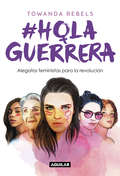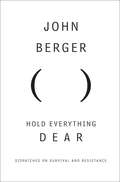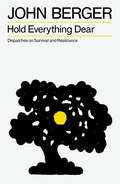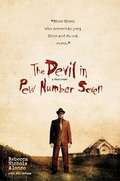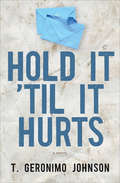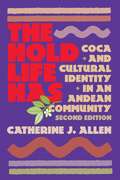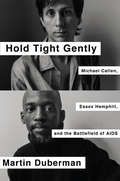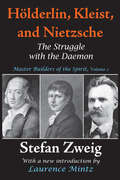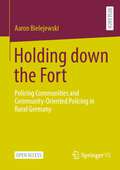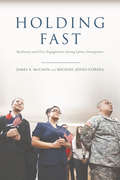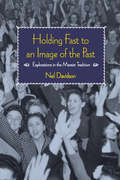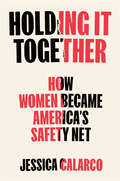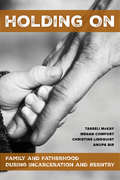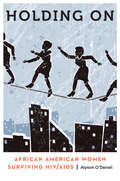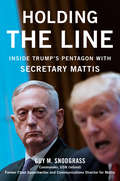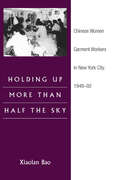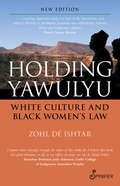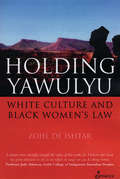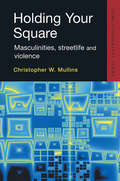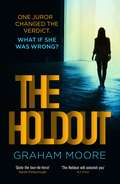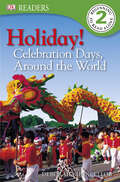- Table View
- List View
#HolaGuerrera: Alegatos feministas para una revolución
by Towanda RebelsUn alegato feminista que sacudirá conciencias. El libro de las creadoras de las campañas HolaPutero y YoTeCreo. #HolaGuerrera, ¿estás harta de ser invisible? ¿Te sientes menospreciada en el trabajo, en la calle, en tu vida diaria? ¿Te enfada escuchar los abusos que sufren las mujeres a cada momento? Si tu respuesta es sí, queremos que sepas que no estás loca, no exageras, no eres ninguna histérica: a todas nos oprimen por la sencilla razón de haber nacido mujeres en un mundo gobernado por la testosterona. Por eso somos muchas, muchísimas, las que estamos en pie de guerra. Y, ¿sabes qué? Te necesitamos a nuestro lado peleando por la igualdad, porque ya va siendo hora, porque estamos hartas de un mundo injusto. Bienvenida a esta lucha formada por batallas de pancartas, bombas de argumentos y balas de palabras. Sacúdete los estereotipos que te encadenan y liberémonos juntas de los roles que ya estamos cansadas de representar. Esta guerra la ganamos todas y todos, porque la revolución será feminista.
Hold Everything Dear: Dispatches on Survival and Resistance (Vintage International)
by John BergerFrom one of the most impassioned of writers of our time, this powerful collection of essays offers a stark portrait of post-9/11 realities. John Berger occupies a unique position in the international cultural landscape: artist, filmmaker, poet, philosopher, novelist, and essayist, he is also a deeply thoughtful political activist. In Hold Everything Dear,his artistry and activism meld in an attempt to make sense of the current state of our world. Berger analyzes the nature of terrorism and the profound despair that gives rise to it. He writes about the homelessness of millions who have been forced by poverty and war to live as refugees. He discusses Afghanistan, Iraq, Palestine, Serbia, Bosnia, China, Indonesia-anyplace where people are deprived of the most basic of freedoms. Berger powerfully acknowledges the depth of suffering around the world and suggests actions that might finally help bring it to an end.
Hold Everything Dear: Dispatches on Survival and Resistance
by John BergerA powerful meditation on political resistance and the global search for justiceFrom the &‘War on Terror&’ to resistance in Ramallah and traumatic dislocation in the Middle East, Berger explores the uses of art as an instrument of political resistance. Visceral and passionate, Hold Everything Dear is a profound meditation on the far extremes of human behaviour, and the underlying despair. Looking at Afghanistan, Palestine and Iraq, he makes an impassioned attack on the poverty and loss of freedom at the heart of such unnecessary suffering.These essays offer reflections on the political at the core of artistic expression and at the center of human existence itself.
Hold for Shirley rev. 1 WISH LIST The Devil In Pew Number Seven
by Elisa Morgan Bob DeMossRebecca never felt safe as a child. In 1969, her father, Robert Nichols, moved to Sellerstown, North Carolina, to serve as a pastor. There he found a small community eager to welcome him—with one exception. Glaring at him from pew number seven was a man obsessed with controlling the church. Determined to get rid of anyone who stood in his way, he unleashed a plan of terror that was more devastating and violent than the Nichols family could have ever imagined. Refusing to be driven away by acts of intimidation, Rebecca’s father stood his ground until one night when an armed man walked into the family’s kitchen . . . And Rebecca’s life was shattered. If anyone had a reason to harbor hatred and seek personal revenge, it would be Rebecca. Yet The Devil in Pew Number Seven tells a different story. It is the amazing true saga of relentless persecution, one family’s faith and courage in the face of it, and a daughter whose parents taught her the power of forgiveness.
Hold It 'Til It Hurts: A Novel
by T. Geronimo Johnson<P>When Achilles Conroy and his brother Troy return from a tour of duty in Afghanistan, their white mother presents them with the key to their past: envelopes containing details about their respective birth parents. <P>After Troy disappears, Achilles--always his brother's keeper--embarks on a harrowing journey in search of Troy, an experience that will change him forever. <P>Heartbreaking, intimate, and at times disturbing, Hold It 'Til It Hurts is a modern-day odyssey through war, adventure, disaster, and love, and explores how people who do not define themselves by race make sense of a world that does. <P>T. Geronimo Johnson was born in New Orleans, Louisiana. His fiction and poetry have appeared in Best New American Voices, Indiana Review, Los Angeles Review of Books, and Illuminations, among others. A graduate of the Iowa Writers' Workshop and a former Stegner Fellow at Stanford University, Johnson teaches writing at the University of California-Berkeley. Hold It 'Til It Hurts is his first book. <P><b>Finalist for the 2013 PEN/Faulkner Award</b>
The Hold Life Has: Coca and Cultural Identity in an Andean Community (Series In Ethnographic Inquiry)
by Catherine J. AllenThis second edition of Catherine J. Allen's distinctive ethnography of the Quechua-speaking people of the Andes brings their story into the present. She has added an extensive afterword based on her visits to Sonqo in 1995 and 2000 and has updated and revised parts of the original text. The book focuses on the very real problem of cultural continuity in a changing world, and Allen finds that the hold life has in 2002 is not the same as it was in 1985.From the Trade Paperback edition.
Hold Me Down: Deacons of Bourbon Street 3 (Deacons of Bourbon Street #2)
by Jackie AshendenMeet the Deacons of Bourbon Street, bad boy bikers who are hell on wheels and heaven between the sheets. Fans of Madeline Sheehan, Katie Ashley, Joanna Wylde and Kristen Ashley, buckle up - you're in for a wild ride. It's time for Hold Me Down by Jackie Ashenden.Leonidas 'Blue' Delacroix might be New Orleans aristocracy but the Deacons of Bourbon Street are his real family. And with their leader murdered he vows to unleash hell on the club's rivals - even if it means making an enemy of the girl that was once his best friend. But after all these years their chemistry is red-hot, and ruthless revenge turns into sweet seduction.For Alice Ray, loyalty is everything. When Blue skipped town she was forced to adopt a new MC family: The Graveyard Ministry. She never forgot Blue's betrayal but seeing him again has awakened old feelings and fiery fantasies. Torn between the motorcycle club that took her in, and the biker who holds the key to her soul, Alice must trust her heart with the deadliest choice of her life.For more badass bikers, don't miss the rest of the Deacons of Bourbon Street series: Make You Burn by Megan Crane, Fire Me Up by Rachael Johns, and Strip You Bare by Maisey Yates.
Hold Tight Gently: Michael Callen, Essex Hemphill, and the Battlefield of AIDS
by Martin DubermanIn December 1995, the FDA approved the release of protease inhibitors, the first effective treatment for AIDS. For countless people, the drug offered a reprieve from what had been a death sentence; for others, it was too late. In the United States alone, over 318,000 people had already died from AIDS-related complications-among them the singer Michael Callen and the poet Essex Hemphill.Meticulously researched and evocatively told, Hold Tight Gently is the celebrated historian Martin Duberman's poignant memorial to those lost to AIDS and to two of the great unsung heroes of the early years of the epidemic.Callen, a white gay Midwesterner who had moved to New York, became a leading figure in the movement to increase awareness of AIDS in the face of willful and homophobic denial under the Reagan administration; Hemphill, an African American gay man, contributed to the black gay and lesbian scene in Washington, D.C., with poetry of searing intensity and introspection.A profound exploration of the intersection of race, sexuality, class, identity, and the politics of AIDS activism beyond ACT UP, Hold Tight Gently captures both a generation struggling to cope with the deadly disease and the extraordinary refusal of two men to give in to despair.
Holderlin, Kleist, and Nietzsche: The Struggle with the Daemon
by Stefan ZweigThis is the second volume in a trilogy in which Stefan Zweig builds a composite picture of the European mind through intellectual portraits selected from among its most representative and influential figures. In 'Hoelderlin, Kleist, and Nietzsche', Zweig concentrates on three giants of German literature to portray the artist and thinker as a figure possessed by a powerful inner vision at odds with the materialism and scientific positivism of his time, in this case, the nineteenth century. Zweig's subjects here are respectively a lyric poet, a dramatist and writer of novellas, and a philosopher. Each led an unstable life ending in madness and/or suicide and not until the twentieth century did each make their full impact. Whereas the nineteenth-century novel is socially capacious in terms of subject and audience, the three figures treated here are prophets or forerunners of modernist ideas of alienation and exile. Hoelderlin and Kleist consciously opposed the worldly harmoniousness of Goethe's classicism in favor of a visionary inwardness and dramatisation of the subjective psyche. Nietzsche set himself as a destroyer and rebuilder of philosophy and critic of the degradation of the German spirit through nationalism and militarism. Zweig's choice of subjects reflects a division in his own soul. The image of Goethe recurs here as the ultimate upholder of Zweig's own ideals: scientist and artist, receptive to world culture, supremely rational and prudent. Yet Zweig was aware that Hoelderlin, Kleist, and Nietzsche were more daring explorers of the dangerous and destructive aspects of man that needed to be seen and comprehended in the clarifying light of poetry and philosophy.
Holding down the Fort: Policing Communities and Community-Oriented Policing in Rural Germany
by Aaron BielejewskiThis Open-Access-book questions the relationship between institutionalized images and understandings of policing – the monolithic ideas common to most, if not all, Western law enforcement agencies – and contextual, situative, and local interactions where the human representatives of policing – street-level officers – come into contact with residents. The political and theoretical association of specific forms of “Western” policing with democratic society can be illustrated in the case of German integration: narratives of reform and essentially forging new democratic police agencies in the “new German states” stand at odds with much of the experience and statements of officers who continued to serve following (Re)Unification. Officers who present their works primarily in terms of their local responsibilities, expectations and more specifically to their unique and individual relationship and connection to their communities downplay the relevance of high-level policing policy. Based on a two-year ethnographic study of policing in a rural county in the German state of Brandenburg, this book explores the local nature of policing both in terms of how police officers imagine their communities to be and with reference to broader societal expectations and assumptions of what police, essentially, are, can effectively do, and should effectively do.
Holding Fast: Resilience and Civic Engagement Among Latino Immigrants
by James A. McCann Michael Jones-CorreaThe fight over immigration reform and immigrants’ rights in the U.S. has been marked by sharp swings in both public sentiment and official enforcement. In 2006, millions of Latino immigrants joined protests for immigration reform. Deferred Action for Childhood Arrivals, a policy granting work permits and protection from deportation to undocumented immigrants who entered the country before age 16, was enacted in 2012, despite a sharp increase in deportations during the Bush and Obama administrations. The 2016 election of Donald J. Trump prompted a surge in anti-immigrant sentiment which threatened DACA and other progressive immigration policies. In Holding Fast, political scientists James McCann and Michael Jones-Correa investigate whether and how these recent shifts have affected political attitudes and civic participation among Latino immigrants. Holding Fast draws largely from a yearlong survey of Latino immigrants, including both citizens and noncitizens, conducted before and after the 2016 election. The survey gauges immigrants’ attitudes about the direction of the country and the emotional underpinnings of their political involvement. While survey respondents expressed pessimism about the direction of the United States following the 2016 election, there was no evidence of their withdrawal from civic life. Instead, immigrants demonstrated remarkable resilience in their political engagement, and their ties to America remained robust. McCann and Jones-Correa examine Latino immigrants’ trust in government as well as their economic concerns and fears surrounding possible deportations of family members and friends. They find that Latino immigrants who were concerned about the likelihood of deportation were more likely to express a lack of trust in government. Concerns about personal finances were less salient. Disenchantment with the U.S. government did not differ based on citizenship status, length of stay in America, or residence in immigrant-friendly states. Foreign-born Latinos who are naturalized citizens shared similar sentiments to those with fewer political rights, and immigrants in California, for example, express views similar to those in Texas. Addressing the potential influence immigrant voters may wield in in the coming election, the authors point to signs that the turnout rate for naturalized Latino immigrant may be higher than that for Latinos born in the United States. The authors further underscore the importance of the parties' platforms and policies, noting the still-tenuous nature of Latino immigrants’ affiliations with the Democratic Party. Holding Fast outlines the complex political situation in which Latino immigrants find themselves today. Despite well-founded feelings of anger, fear, and skepticism, in general they maintain an abiding faith in the promise of American democracy. This book provides a comprehensive account of Latino immigrants’ political opinions and a nuanced, thoughtful outlook on the future of Latino civic participation. It will be an important contribution to scholarly work on civic engagement and immigrant integration.
Holding Fast to an Image of the Past
by Neil DavidsonDavidson explores classic themes in historical materialism as he explains: the moments of transition from the dominance of one mode of production to another; the process of social revolution which accompany these transitions; and the problem of nationalism, both as a theoretical challenge to Marxism's capacity for historical explanation and as a practical obstacle to socialist consciousness.
Holding It Together: How Women Became America's Safety Net
by Jessica CalarcoOther countries have social safety nets. The U.S. has women. Holding It Together chronicles the causes and dire consequences.America runs on women—women who are tasked with holding society together at the seams and fixing it when things fall apart. In this tour de force, acclaimed Sociologist Jessica Calarco lays bare the devastating consequences of our status quo. Holding It Together draws on five years of research in which Calarco surveyed over 4000 parents and conducted more than 400 hours of interviews with women who bear the brunt of our broken system. A widowed single mother struggles to patch together meager public benefits while working three jobs; an aunt is pushed into caring for her niece and nephew at age fifteen once their family is shattered by the opioid epidemic; a daughter becomes the backstop caregiver for her mother, her husband, and her child because of the perceived flexibility of her job; a well-to-do couple grapples with the moral dilemma of leaning on overworked, underpaid childcare providers to achieve their egalitarian ideals. Stories of grief and guilt abound. Yet, they are more than individual tragedies. Tracing present-day policies back to their roots, Calarco reveals a systematic agreement to dismantle our country&’s social safety net and persuade citizens to accept precarity while women bear the brunt. She leads us to see women's labor as the reason we've gone so long without the support systems that our peer nations take for granted, and how women&’s work maintains the illusion that we don't need a net. Weaving eye-opening original research with revelatory sociological narrative, Holding It Together is a bold call to demand the institutional change that each of us deserves, and a warning about the perils of living without it.
Holding On: Family and Fatherhood during Incarceration and Reentry
by Tasseli McKay Megan Comfort Christine Lindquist Anupa BirHolding On reveals the results of an unprecedented ten-year study of justice-involved families, rendering visible the lives of a group of American families whose experiences are too often lost in large-scale demographic research. Using new data from the Multi-site Family Study on Incarceration, Parenting, and Partnering—a groundbreaking study of almost two thousand families, incorporating a series of couples-based surveys and qualitative interviews over the course of three years—Holding On sheds rich new light on the parenting and intimate relationships of justice-involved men, challenging long-standing boundaries between research on incarceration and on the well-being of low-income families. Boldly proposing that the failure to recognize the centrality of incarcerated men’s roles as fathers and partners has helped to justify a system that removes them from their families and hides that system’s costs to parents, partners, and children, Holding On considers how research that breaks the false dichotomy between offender and parent, inmate and partner, and victim and perpetrator might help to inform a next generation of public policies that truly support vulnerable families.
Holding On: African American Women Surviving HIV/AIDS (Anthropology of Contemporary North America)
by Alyson O'DanielIn Holding On anthropologist Alyson O’Daniel analyzes the abstract debates about health policy for the sickest and most vulnerable Americans as well as the services designated to help them by taking readers into the daily lives of poor African American women living with HIV at the advent of the 2006 Treatment Modernization Act. At a time when social support resources were in decline and publicly funded HIV/AIDS care programs were being re-prioritized, women’s daily struggles with chronic poverty, drug addiction, mental health, and neighborhood violence influenced women’s lives in sometimes unexpected ways. An ethnographic portrait of HIV-positive black women and their interaction with the U.S. healthcare system, Holding On reveals how gradients of poverty and social difference shape women’s health care outcomes and, by extension, women’s experience of health policy reform. Set among the realities of poverty, addiction, incarceration, and mental illness, the case studies in Holding On illustrate how subtle details of daily life affect health and how overlooking them when formulating public health policy has fostered social inequality anew and undermined health in a variety of ways.
Holding Space: On Loving, Dying, and Letting Go
by Amy Wright GlennA look at the spiritual, emotional, and philosophical implications of end-of-life care by an elegant and literary writer who is a hospital chaplain.As a hospital chaplain, Amy Wright Glenn has been present with those suffering from suicide, trauma, disease, and unforeseen accidents and has been witness to the intense grief and powerful insights that so often accompany loss. She weaves together memoir, philosophical inquiry, and cutting-edge research on death/dying to chronicle how we, as individuals and as a culture, handle everything from grief to mortality.Glenn is also a professional birth doula with a deep and committed mindfulness practice who has thought deeply about the significance of human love and loss. She asks us to embrace the task of being present with what is -- through courageous and mindful expressions of compassionate presence -- and helps us to accept the fact of our own mortality on a visceral and emotional level, not simply as an intellectual abstraction.Holding Space concludes by integrating key insights drawn from working directly with the dying into a moving and compelling meditation on the healing power of "holding space" for all involved in caring for the dying, a healing sorely needed in our culture at this time.
Holding the Line: Inside Trump's Pentagon with Secretary Mattis
by Guy M. Snodgrass"This is the memoir America wishes Jim Mattis had written." —The Washington PostAn insider's sometimes shocking account of how Defense Secretary James Mattis led the US military through global challenges while serving as a crucial check on the Trump Administration.For nearly two years as Trump's Secretary of Defense, General James Mattis maintained a complicated relationship with the President. A lifelong Marine widely considered to be one of America's greatest generals, Mattis was committed to keeping America safe. Yet he served a President whose actions were frequently unpredictable and impulsive with far-reaching consequences. Often described as the administration's "adult in the room," Mattis has said very little about his difficult role, and since his resignation has kept his views of the President and his policies private. Now, Mattis's former chief speechwriter and communications director, Guy M. Snodgrass, brings readers behind that curtain. Drawing on his seventeen months working with Mattis, Snodgrass reveals how one of the nation's greatest generals walked a political tightrope while leading the world's most powerful military.Snodgrass gives us a fly-on-the-wall view as Mattis... • Reacted when learning about major policy decisions via Twitter rather than from the White House. • Minimized the damage done to our allies and diplomatic partners. • Slow-rolled some of Trump's most controversial measures, with no intention of following through.As the first book written by an insider with firsthand knowledge of key decisions and moments in history, Holding the Line is a must-read for those who care about the presidency and America's national security. It's filled with never-before-told stories that will both alarm and reassure, a testament to the quiet and steady efforts of General Mattis and the dedicated men and women he led at the Department of Defense.
Holding Up More Than Half the Sky: Chinese Women Garment Workers in New York City, 1948-92
by Xiaolan BaoIn 1982, twenty thousand Chinese American garment workers--mostly women--went on strike in New York's Chinatown and forced Chinese garment industry employers in the city to sign a union contract. In this pioneering study, Xiaolan Bao penetrates to the heart of Chinese American society to explain how this militancy and organized protest, seemingly so at odds with traditional Chinese female behavior, came about. Blending poignant and dramatic personal stories culled from over a hundred interviews with a detailed history of the garment industry, Chinese immigrant labor, and the Chinese community in New York, Bao shows how the participation of married women in wage-earning labor outside the home profoundly transformed their image and relationships.
Holding Up More Than Half the Sky: Chinese Women Garment Workers in New York City, 1948-92 (Asian American Experience)
by Xiaolan BaoIn 1982, 20,000 Chinese-American garment workers—most of them women—went on strike in New York City. Every Chinese garment industry employer in the city soon signed a union contract. The successful action reflected the ways women's changing positions within their families and within the workplace galvanized them to stand up for themselves. Xiaolan Bao's now-classic study penetrates to the heart of Chinese American society to explain how this militancy and organized protest, seemingly so at odds with traditional Chinese female behavior, came about. Drawing on more than one hundred interviews, Bao blends the poignant personal stories of Chinese immigrant workers with the interwoven history of the garment industry and the city's Chinese community. Bao shows how the high rate of married women employed outside the home profoundly transformed family culture and with it the image and empowerment of Chinese American women. At the same time, she offers a complex and subtle discussion of the interplay of ethnic and class factors within New York's garment industry. Passionately told and prodigiously documented, Holding Up More Than Half the Sky examines the journey of a community's women through an era of change in the home, on the shop floor, and walking the picket line.
Holding Yawulyu: White Culture and Black Women's Law
by Zohl Dé IshtarFor two years, Zohl dé Ishtar lived in a one-room tin shed with the women Elders of Balgo. As their "Culture Woman", Zohl assisted the Elders in establishing and coordinating the Kapululangu Women's Law and Culture Centre. Holding Yawulyu: White Culture and Black Women's Law tells the amazing story of Zohl's journey as it documents White culture's impact on Indigenous Women's Law. Seventeen years later, Zohl remains at Balgo and provides a new Preface to this edition. Holding Yawulyu is an investigation into the inter-cultural relationship of White and Indigenous societies through successive waves of missionary, bureaucratic and art industry influence.
Holding Yawulyu: White Culture and Black Women's Law
by Zohl Dé IshtarThis deeply moving, historical account of indigenous culture--specifically, the elder women of Wirrimanu--offers profound insight into white culture's impact on indigenous women's Yawulyu (law) and an analysis of the competing interests that can make indigenous and white interactions complex, painful, and fraught with problems.
Holding Your Square (Routledge Advances in Ethnography)
by Christopher MullinsThis book is about the meanings of masculinities within the social networks of the streets of an American city (St Louis, Missouri), and how these shaped perceptions and enactments of violence. Based on a large number of interviews with offenders the author provides a rich description of life on the streets, contextualizing criminal violence within this deviant subculture, and with a specific focus on issues of gender. The book provides one of the most detailed descriptions yet of the forms masculinity takes in disadvantages communities in the United States. It establishes how street based gender identity motivated and guided men through violent encounters, exploring how men's relationships with women and their families instigated violence. One key issue addressed is why men resorted to violence in certain situations and not in others, exploring the range of choices open to them and how these opportunities were interpreted. The book makes a major contribution to the study of the relationship between masculinities and violence, making use of a much larger sample than elsewhere.
The Holdout: The tense, gripping Richard and Judy Book Club pick for 2021
by Graham Moore'The most gripping and satisfying thriller I've read in more than a decade' Sophie Hannah'One of the best legal thrillers ... as elegant and gripping as Scott Turow's Presumed Innocent' Daily Mail'Quite the tour de force! Twelve Angry Men meets Chinatown and creates something of its own' Sarah Pinborough'This is a tense, emotionally charged, scary-good, stand-out read' Caroline Kepnes**********MAJOR TV SERIES COMING SOON - FROM THE PEOPLE WHO BROUGHT YOU NETFLIX'S UNBELIEVABLE... One juror changed the verdict. What if she was wrong?'Ten years ago we made a decision together...'Fifteen-year-old Jessica Silver, heiress to a billion-dollar fortune, vanishes on her way home from school. Her teacher, Bobby Nock, is the prime suspect. It's an open and shut case for the prosecution, and a quick conviction seems all but guaranteed. Until Maya Seale, a young woman on the jury, persuades the rest of the jurors to vote not guilty: a controversial decision that will change all of their lives forever.Ten years later, one of the jurors is found dead, and Maya is the prime suspect.The real killer could be any of the other ten jurors. Is Maya being forced to pay the price for her decision all those years ago?**********'Plunge a syringe filled with adrenaline into the heart of Twelve Angry Men and you've got The Holdout: the first legal thriller in thirty years - ever since Presumed Innocent and A Time to Kill electrified readers the world over - to rank alongside those two modern classics.' AJ Finn'A page-turning legal thriller with a twisty and absolutely riveting plot ... plus a strong and compelling female heroine. You won't be able to put this one down!' Lisa Scottoline'Clever, well-written and twistier than a can of silly-string. You absolutely need to read The Holdout!' Emma Kavanagh'Amazing thriller, deserves to be one of the biggest books of 2020' Michelle Davies'Terrific, twisty and well-structured thriller' Adele Geras
Holiday!: CELEBRATIONS AROUND THE WORLD (DK Readers Level 2)
by DKIt's time for fun and festivities - the year is full of days to celebrate! Learn about holidays all over the world with this Level 2 DK Reader. Packed with full-color photographs, lively illustrations, and engaging, age-appropriate stories to introduce young children to a life-long love of reading. These amazing stories are guaranteed to capture children's interest while developing their reading skills. Perfect for reading together! The playful images in this eBook are enhanced with entertaining animations and surprising sounds to bring this story to life.
Holiday!: CELEBRATIONS AROUND THE WORLD (DK Readers Level 2)
by DKIt's time for fun and festivities - the year is full of days to celebrate! Learn about holidays all over the world with this Level 2 DK Reader. Packed with full-color photographs, lively illustrations, and engaging, age-appropriate stories to introduce young children to a life-long love of reading. These amazing stories are guaranteed to capture children's interest while developing their reading skills. Perfect for reading together!
